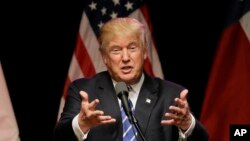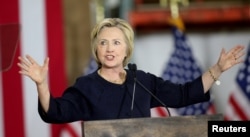Donald Trump, the presumptive U.S. Republican presidential nominee, acknowledges he is struggling to win vocal support from Republican officials, but Tuesday voiced little concern that he is badly trailing Democrat Hillary Clinton in fundraising for the November 8 national election.
"We have a party that – I mean, I'm having more difficulty frankly with some of the people in the party than I am with the Democrats. Because they just don't want to come on," Trump told NBC's Today show. "They will probably eventually come on. Honestly, if they don't, it's just fine. I can win it either way."
The billionaire real estate mogul and one-time television reality show host assessed his campaign in the hours after new reports showed his campaign had just $1.3 million on hand at the start of June, compared to Clinton's $42.5 million.
"Hillary Clinton will spend a billion dollars of Wall Street money and money from the Middle East," Trump told Fox News' “Fox & Friends” show. "I can go a different route; I can just spend my own money." He was referring to the largely self-funded campaign he ran in surging past 16 other Republican candidates to become the party's likely nominee at its national convention next month.
Trump said, "I've raised a lot of money, but you also have to have some help from the party."
Top Republican officials, including key lawmakers in Congress, have been slow to embrace Trump's candidacy. They say they plan to vote for him even as they attack his call for a temporary ban on Muslims entering the United States in an effort to stop a new terrorist attack, the deportation of 11 million illegal immigrants living in the country, and construction of a wall along the U.S.-Mexico border to halt more immigrants from illegally entering the United States.
Some Republicans, including 2012 presidential nominee Mitt Romney, have rejected Trump's candidacy, rebuking his comments as insults against Muslims, Mexicans, women and the disabled.
Trump campaign reboot?
With his fundraising lagging and a collection of national political surveys showing Clinton, a former U.S. secretary of state, with an average of a 5.8-percentage point lead, Trump on Monday fired his campaign manager, Corey Lewandowski.
One longtime U.S. political scientist, Alan Abramowitz of Emory University in Atlanta, told VOA that Trump is running "the most inept presidential campaign that I can remember." Abramowitz cited what he said are Trump's "lack of focus, lack of strategy, disorganization."
"This is a guy who's never run for office before," Abramowitz said, "but he shows no interest in learning about subjects he knows little about. He's running against a politically vulnerable Democratic candidate, but he has to stop the insults and name-calling."
Asked what Trump has to do to regain his footing in the campaign, Abramowitz said, "He'd have to stop being Donald Trump and that's not going to happen."
Another analyst, political scientist John Sides at the George Washington University in Washington, said, "It is remarkable that Clinton can go up with ads in the battleground states and have no Trump response. Or that he has only 30 field staff, while she has something like 800.
"To be clear," Sides said, "I'm not suggesting that we'll see massive double-digit effects of Clinton's ads or ground game. Party identification still provides some ballast for voters, and this may limit the swing in the electorate. But, Trump's strategy, if we want to call it that, amounts to a sort of unilateral disarmament."
A new CNN/ORC poll shows Clinton, seeking to become the first female U.S. president, with a 47-42 percent national lead over Trump, an edge that narrows slightly to 42-38 in a four-way race that includes Libertarian Gary Johnson (9 percent) and Green Party candidate Jill Stein (8 percent).
A Quinnipiac University poll of three key battleground states showed Clinton with a 47-39 percent lead over Trump in the southeastern state of Florida, up from a near-even count a month ago. The poll, however, showed Trump and Clinton virtually even in head-to-head matchups in Ohio and Pennsylvania, with Clinton slightly ahead in four-way contests in the two states that include Johnson and Stein.
Financial reports filed Monday with the Federal Election Commission showed Clinton raised more than $26 million in May and Trump $5.6 million.
Both Trump and Clinton will get help from their parties and outside groups known as super PACs that will spend money on television advertisements backing the candidates; but, it is important for each of them to have a lot of their own money on hand to spend on ads of their own and campaign efforts across the 50 states.
The last presidential election in 2012 shows just how much cash is needed in modern campaigns.
President Barack Obama's campaign committee spent $775 million of its own money to get him re-elected, while Romney spent $460 million. The parties and super PACS added several hundred million more dollars to the race.
Clinton has outspent Trump $196 million to $63 million so far, according to the FEC figures. At this point in the 2012 race, Obama had outspent Romney $232 million to $107 million.













